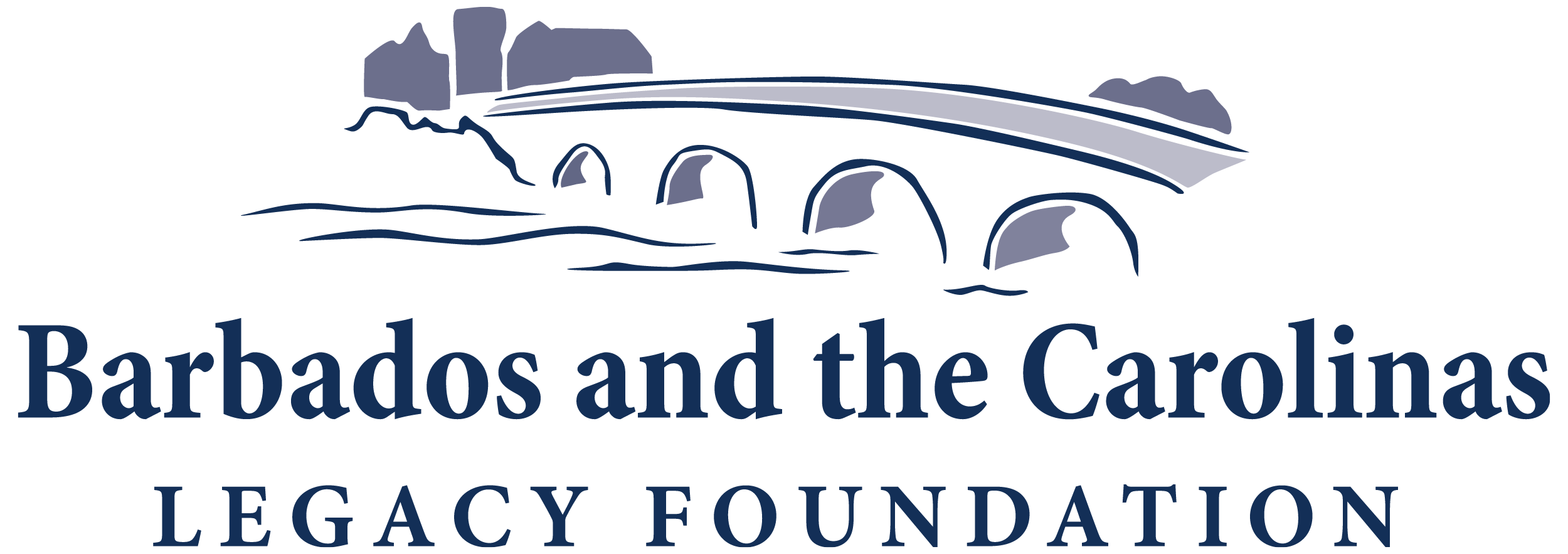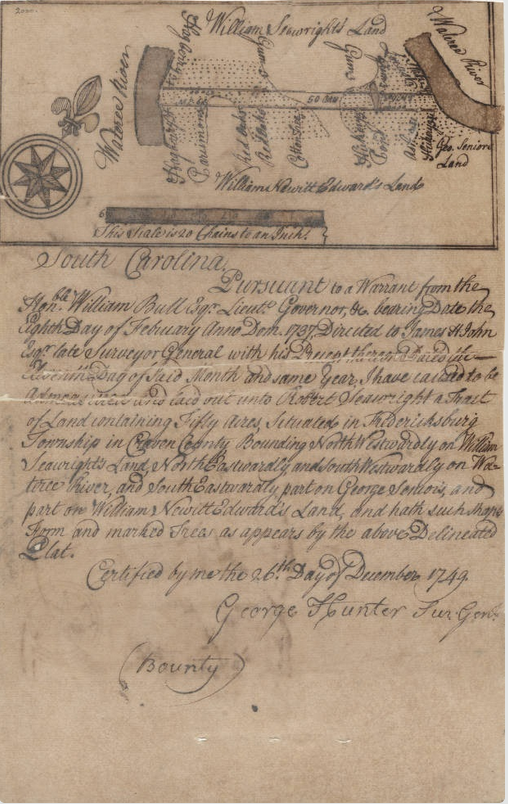Patents - Charter - Grants - Plantation - Land Use and Beneficiaries
Land! Land! Land! The Barbados Adventurers left Speightstown, Barbados, in 1669 on an expedition to find more terra firma – land. The journey across the sometimes treacherous waters of the Caribbean Sea posed no insurmountable challenges. Veteran sea captain, William Hilton, with his crew of 22, set sail, and some months later the crew heard the anticipated shout: “Land ahoy!” Before them was land aplenty lying between 36 degrees and 31 degrees north latitude – a territory which reached from the Atlantic to the Pacific– so far that their eyes could not bring into view the massive expanse of land before them. The Province of Carolina, or Land of Charles, was all theirs.
A King’s Grant issued by King Charles II granted the Lord Proprietors the power and control of this new territory to repay them for their loyalty during the Cromwellian regime in Britain. The fact that Native tribes occupied and roamed this massive expanse of forested terrain wasn’t of paramount concern. Barbados, the island they just departed, at a meager 166 square miles had little space or opportunities for younger heirs and heiresses to possess. In Barbados, plantations replaced forests within a few decades. Now the ongoing quest for more land had driven the lords further. Now here’s Carolina: Barbados can fit comfortably into McCormick County, South Carolina’s smallest county, twice with room to spare. The division of the Carolinas into north and south would come much later.
With this backdrop, I’ll proceed on my virtual jaunt back in time. I’m prepared for every eventuality. I have some specialty binoculars – a set of three. One is for refocusing on the past. The second is for focusing on the present. The third is for peering into the future. They are all packed neatly into my virtual knapsack, and off I go. Come with me!
With new eyes I reflect on things I see, and I ponder: How might this story unfold? How much of what I see is going to be sustainable? Which particular aspects of what I see will cause repercussions later? What if…? What if…? The “Barbadoes Proclamation,” heralded in Barbados on November 4, 1670, beckons persons interested to join the adventurers on an expedition. They are told what’s required of them–what they’ll get in return. They embark at Speightstown, Barbados, en route to the Carolinas.
Once in Charles Towne, the captain and crew are greeted warmly by a Native tribe leader. He offers sage advice and wise counsel regarding the lay of the land. Islands small and large punctuate the coastal landscape and waterways, and marsh grass spreads among the many rivers. Sometimes the grass is all but submerged by water, and at other times it appears dry as a chip. Mother Nature is faithful to dictate the ebb and flow of the tides: sometimes low, sometimes high. There are barrier islands that the Native tribes roam and occupy. The enslaved will soon be marooned on these islands – cut off from the mainland. They will become very familiar with the waterways which are navigable by using small boats.
Forthwith, patents and grants, self-serving legal documents which convey broad and far-reaching control of this new domain to the Lord Proprietors, are issued. With Charter and King’s Grants in hand, power and control have been fully conferred. Land can now be passed on to heirs and other assigns. Land acquisition, land holding, and land usage, from will from now on be determined and regulated by the Proprietary Government. Landowners require able-bodied men, indentured servants, to fell trees. Deforestation (a process that rendered Barbados bereft of forest) begins in order to prepare the Carolinas for land use. There is ample timber to fell and market.
In time, plantations begin to appear in close proximity to the navigable waterways. Marshy areas along rivers like the Ashley and the Cooper (formerly known by Native Indian names) give rise to rice and other crops as well as to phosphate mining. Encounters between Native tribes, indentured servants, and enslaved groups (brought first from Barbados/Caribbean then later directly from West Africa) is inevitable. A recipe for conflict arises which would belie the idyllic panoramic vistas. The dream of the colonists is a reality, but what comes next? I’m ready to focus on the present. My ponderings are still unresolved. The Lord Proprietors, wealthy land owners and the ruling class, have long departed this vale. Their legacies live on. Deed abstracts, wills, and other legal documents reflect how and to whom distributions have been made through the centuries. Timber producing is still a valuable use of land. Plantations that once produced rice, indigo, cotton, and other crops lay fallow; gated communities, large golf courses, and immense industrial complexes have replaced them. Thousands more acres are placed in land trusts for shelter from development.
Patents – Charter – Grants – Plantation – Land use and Beneficiaries
A different reality emerges for descendants of the enslaved. Many reside in areas that lack sufficient capital to maintain their own properties and community spaces. Neighborhood schools are inadequate, and blight and decay have become incubators for poverty, crime and more. Displacement and “gentrification” (a modern concept) is prevalent. Those with the ability to acquire property continue to do so, but those who can’t are displaced. Land is still desirable and holds it sway.
As a court reporter for 28 years I’ve been privy to the adjudication of many a lawsuit that involved land disputes. I found these cases particularly informative. They show clearly
that the past encroaches and “haunts” the present. In some disputes, a litigant’s most convincing evidence in a court of law to support a claim of ownership to a tract of land is a chain of title that goes back to a King’s Grant. I also find it extremely fascinating that the law applied in the adjudication of such matters is based on chancery law — equity law brought and introduced by the colonial settlers here in the South. Once a King’s Grant is established it proves ownership not only of the high ground, but to marshy areas that extend to the navigable streams and waterways.
I’ve come to learn how many of the surrounding Sea Islands were owned by many of the original settlers from Barbados and other Caribbean islands. These families’ names are recorded on the pages of American history – the “Founding Fathers,” or in the Carolinas, the Lord Proprietors.
Voices are now being raised by the descendants of the masses whose ancestors labored on area plantations and surrounding Sea
Islands. These islands weren’t deemed desirable to the ruling class because of the abundance of mosquitos and other vermin. There’s also clamor and reverberations from descendants of Native groups, who have long since been displaced, yet rivers, creeks, streets, and communities all still bear the names of their tribes. In some cases, to the contrary, entire communities and islands have been renamed and bear the names of those who settled the land.
The descendants of some of the ruling class acknowledge and try to mitigate the negative impact of the past; however, others, particularly those from the indentured servant class and some “poor whites,” hold steadfastly to the position that they are the rightful recipients of that for which their ancestors fought, and give no thought to the laws of the land that inured to their benefit.
I now make haste to this trail which focuses on the future. I’ve learned many lessons from my jaunt back to the past and the present. I scratch my head– how can I apply my observations and share them? “Life moves on a pace.” We each make “our entrances and our exits” on the world stage. One observation is that what we do today impacts the future long after we’ve exited the present. Another is that we have the opportunity to learn lessons from the past and be mindful of the future. I also observe that knowledge of the past is liberating for some. Once knowledge is acquired, those who were denied will be able to pursue fairness and opportunity. Large private golf courses and gated communities both in Barbados/Caribbean and the Carolinas are constant reminders of how things were. Land use choices continue to impact all sectors of society in Barbados and the Carolinas. A challenge for the future is how to remove unnecessary systemic obstacles for the less advantaged henceforth. Life, as it unfolds in every era, is challenging for the masses. Some succeed and some don’t. Let’s accept the challenge for 2014 to be agents for success and not failure.
Rhoda Green / CEO B&CLF

